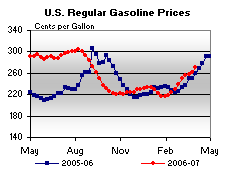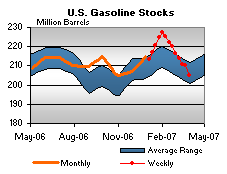By Bonddad
bonddad@prodigey.net
From CBS:
The average cost of self-serve regular gasoline rose about 18 cents per gallon nationwide over the past two weeks, according to a survey released Sunday.
That translated to an average price of $2.78 a gallon, according to the latest Lundberg Survey of 7,000 gas stations across the country.
On April 6, a gallon of midgrade gasoline averaged about $2.89, and premium was nearly $3.
I've been closely following gas prices for the last 5-6 weeks for several reasons.
1.) They are a big component of inflationary pressures. As it appears a bit more likely that we may have a recession, it's a good idea to know what the possibilities of a Federal Reserve rate cut are. In his latest Congressional testimony, Bernanke stated declining oil prices were the primary reason for a decreasing inflationary pressures:
Core inflation, which is a better measure of the underlying inflation trend than overall inflation, seems likely to moderate gradually over time. Despite recent increases in the price of crude oil, energy prices are below last year’s peak. If energy prices remain near current levels, greater stability in the costs of producing non-energy goods and services will reduce pressure on core inflation over time. Of course, the prices of oil and other commodities are very difficult to predict, and they remain a source of considerable uncertainty in the inflation outlook.
....
To date, the incoming data have supported the view that the current stance of policy is likely to foster sustainable economic growth and a gradual ebbing in core inflation. Because core inflation is above the levels most conducive to the achievement of sustainable growth and price stability, the Committee indicated in the statement following its recent meeting that its predominant policy concern remains the risk that inflation will fail to moderate as expected.
The problem here is gas prices were about 15 cents/gallon lower than present prices when Bernanke made that speech. That means from Bernanke's perspective, inflationary pressures are increasing and barring a complete move into recession a rate cut is not going to happen.
2.) Consumer spending is the only thing holding the economy above recession -- at least according to the Dallas Fed. In a recent analysis of the US economy, they noted that although residential and business investment is down, consumer spending remains high. The Dallas Fed was essentially summarizing the latest GDP report from the BEA. So what the economy needs right now is for the consumer to keep spending to keep us out of a recession. The problem is increasing gas prices make the likelihood of a consumer pullback a bit higher.
So, where are gas prices right now?
According to the Department of Energy:
Gasoline prices saw another significant increase for the week of April 2, 2007, jumping 9.7 cents to 270.7 cents per gallon. This is the ninth consecutive week of increases; prices are now 11.9 cents per gallon higher than at this time last year. All regions reported higher prices. East Coast prices were up 9.6 cents to 267.1 cents per gallon, while Midwest prices rose 9.6 cents to 261.4 cents per gallon. The Gulf Coast saw the largest regional increase, with prices up 12.3 cents to 256.5 cents per gallon. In the Rocky Mountains, prices increased 8.1 cents to 261.9 cents per gallon. West Coast prices were up 8.0 cents to 309.6 cents per gallon, with the average price for regular grade in California up 7.6 cents to 322.8 cents per gallon, 48.5 cents per gallon above last year's price.
Here's a chart from the same report. The red line -- which is higher -- represents this years prices.
One of the primary reasons for the decease is a declining inventory of gasoline. Here is a chart of gasoline stockpiles represented by the orange line.
So, what does all this mean?
We're probably going to have higher gas prices as the summer progresses. And the higher those prices go, the more likely consumers will pull back on their spending. Considering they are the only economic sector increasing their economic input, their cut backs would not be welcome.


No comments:
Post a Comment